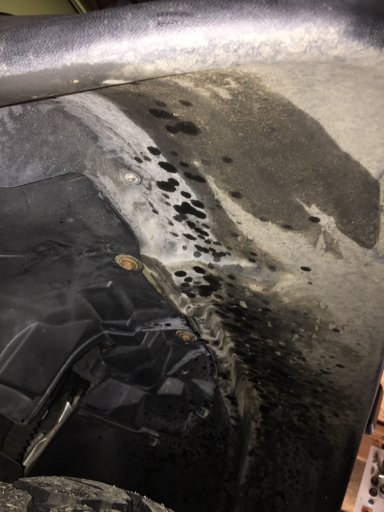Vehicle Cleaning
How many of us, more often than not, put off really cleaning our overland rigs? I’m not talking about driving in the rain, fording a stream or two to wash off the major trail grime, or heaven forbid, even a quick shot at the power wash. We all spend a lot of time and money on our rigs, and a certain amount of mud and grunge gives us trail cred, right? Besides, a rig that’s TOO clean and shiny, could be mistaken for a poser mobile - GASP!
I’m actually talking about a thorough cleaning as a part of maintenance and inspection. It’s hard to find leaks, worn parts, loose bits etc., when there is mud, ice, and other rewards of a successful expedition caked on and under your vehicle. I always try (try being the operative word here) to give my beast a thorough cleaning and inspection immediately post and pre adventure. It would be unfortunate to fill your axle housing with sandy water, have your lockers malfunction, or heaven forbid, loose your brakes because you missed signs of a problem that were covered up with remnants of your last adventure.
Here are a couple of personal examples. Most recently, as in yesterday, I cleaned off all of the caked on mud, sand and ice from the Jeep after a short jaunt up Jones Pass road to do some winter hiking. It was not a long trip, we traveled up the road until the snow depth made further forward progress questionable. Since it was snowing, and we were likely to be gone a few hours at least, we opted to stop and hike in the rest of the way. Coming out was a little more challenging, and we managed to collect a fair amount of mud and ice on the rig.
But, I digress. When we got back to town, we stopped by a self wash and thoroughly cleaned the grunge off. I pulled the shiny clean Jeep into the garage to do some maintenance - oil change and tire rotation, and was a bit miffed to find this…

One of the telltale signs of a bad axle seal. Gear oil spray on the inner fender well. ARRRRGGGHHHH! This was not readily apparent when I was washing off the mud and ice from the wheel well. Not a critical failure in the general scheme of things, but an irritation none the less. Especially since replacing these particular seals requires removal of the carrier in the diff, as well as the wheel/brake/hub bits. If the leak or damage to the seal is bad enough, you can loose your gear oil at an alarming rate, and/or dirty water can end up in your diff from fording the errant stream. Mine is not there yet, and this seems to be a very new leak, like just started on this trip.
This is a relatively common failure on off road vehicles that actually see off road use, at least on Jeeps, Rovers and older Toyotas. I’ve replaced many axle seals on all of the above - much easier on old Land Cruisers and Rovers than Jeeps…
Another story - a couple of years ago I was doing the same post adventure cleaning and inspection on my Rover Disco1 and noticed a little weep in one of the steel brake lines. It was very minor, but noticeable on the freshly cleaned line and undercarriage. I ran to the local parts store and bough a replacement line. I lifted the rear end to remove the wheel and create some working space so I could replace the line, and SNAP the line broke. As it turns out, the plastic anchor on the axle housing that prevents the steel line from flexing had broken, and the articulation from lifting the chassis had strained the line and snapped it at the weak point.
This was an easy repair, but could have been a catastrophic trail failure. I would not have found this had I not take the time to thoroughly wash all the mud and grime from the rig and do a quick inspection. The lack of significant articulation of the suspension in daily driving would likely have meant I would not have noticed anything until my next dirt excursion that forced significant suspension flex. Then it would have been too late - out on the trail and no brakes!
That’s just two examples from my own personal experience. We all modify our machines to some degree, lifts, lockers, lights, air compressors, winches etc. All of these things add new and/or different failure points, wires and hoses to get worn and rubbed spots, new stress points, and new parts and equipment. How about under the hood? How many of us clean the engine and engine bay on our vehicles on a regular basis. You have to be a bit more careful here, but it’s just as important. It helps find leaking power steering pumps, oil return hoses, cracked or deteriorating coolant hoses and belts etc.
Since for many, if not most of us, our adventure vehicles are also our daily drivers, wear and tear, maintenance and repair is an ongoing dance. Even rigs that see only occasional offload use, if they are modded, require more care and inspection than their unmodified siblings. Having an issue around town is usually nothing more that an irritation and inconvenience, and a quick call to the local auto club and the recovery is handled. It could be a much more serious and costly endeavor somewhere off the beaten path.
Since one of the core tenants of OverlandBound is safety and preparedness, I thought I would share my thoughts here. Seriously, how many of us really do a thorough post and/or pre-trip inspection before heading off into the wilds….
How many of us, more often than not, put off really cleaning our overland rigs? I’m not talking about driving in the rain, fording a stream or two to wash off the major trail grime, or heaven forbid, even a quick shot at the power wash. We all spend a lot of time and money on our rigs, and a certain amount of mud and grunge gives us trail cred, right? Besides, a rig that’s TOO clean and shiny, could be mistaken for a poser mobile - GASP!
I’m actually talking about a thorough cleaning as a part of maintenance and inspection. It’s hard to find leaks, worn parts, loose bits etc., when there is mud, ice, and other rewards of a successful expedition caked on and under your vehicle. I always try (try being the operative word here) to give my beast a thorough cleaning and inspection immediately post and pre adventure. It would be unfortunate to fill your axle housing with sandy water, have your lockers malfunction, or heaven forbid, loose your brakes because you missed signs of a problem that were covered up with remnants of your last adventure.
Here are a couple of personal examples. Most recently, as in yesterday, I cleaned off all of the caked on mud, sand and ice from the Jeep after a short jaunt up Jones Pass road to do some winter hiking. It was not a long trip, we traveled up the road until the snow depth made further forward progress questionable. Since it was snowing, and we were likely to be gone a few hours at least, we opted to stop and hike in the rest of the way. Coming out was a little more challenging, and we managed to collect a fair amount of mud and ice on the rig.
But, I digress. When we got back to town, we stopped by a self wash and thoroughly cleaned the grunge off. I pulled the shiny clean Jeep into the garage to do some maintenance - oil change and tire rotation, and was a bit miffed to find this…

One of the telltale signs of a bad axle seal. Gear oil spray on the inner fender well. ARRRRGGGHHHH! This was not readily apparent when I was washing off the mud and ice from the wheel well. Not a critical failure in the general scheme of things, but an irritation none the less. Especially since replacing these particular seals requires removal of the carrier in the diff, as well as the wheel/brake/hub bits. If the leak or damage to the seal is bad enough, you can loose your gear oil at an alarming rate, and/or dirty water can end up in your diff from fording the errant stream. Mine is not there yet, and this seems to be a very new leak, like just started on this trip.
This is a relatively common failure on off road vehicles that actually see off road use, at least on Jeeps, Rovers and older Toyotas. I’ve replaced many axle seals on all of the above - much easier on old Land Cruisers and Rovers than Jeeps…
Another story - a couple of years ago I was doing the same post adventure cleaning and inspection on my Rover Disco1 and noticed a little weep in one of the steel brake lines. It was very minor, but noticeable on the freshly cleaned line and undercarriage. I ran to the local parts store and bough a replacement line. I lifted the rear end to remove the wheel and create some working space so I could replace the line, and SNAP the line broke. As it turns out, the plastic anchor on the axle housing that prevents the steel line from flexing had broken, and the articulation from lifting the chassis had strained the line and snapped it at the weak point.
This was an easy repair, but could have been a catastrophic trail failure. I would not have found this had I not take the time to thoroughly wash all the mud and grime from the rig and do a quick inspection. The lack of significant articulation of the suspension in daily driving would likely have meant I would not have noticed anything until my next dirt excursion that forced significant suspension flex. Then it would have been too late - out on the trail and no brakes!
That’s just two examples from my own personal experience. We all modify our machines to some degree, lifts, lockers, lights, air compressors, winches etc. All of these things add new and/or different failure points, wires and hoses to get worn and rubbed spots, new stress points, and new parts and equipment. How about under the hood? How many of us clean the engine and engine bay on our vehicles on a regular basis. You have to be a bit more careful here, but it’s just as important. It helps find leaking power steering pumps, oil return hoses, cracked or deteriorating coolant hoses and belts etc.
Since for many, if not most of us, our adventure vehicles are also our daily drivers, wear and tear, maintenance and repair is an ongoing dance. Even rigs that see only occasional offload use, if they are modded, require more care and inspection than their unmodified siblings. Having an issue around town is usually nothing more that an irritation and inconvenience, and a quick call to the local auto club and the recovery is handled. It could be a much more serious and costly endeavor somewhere off the beaten path.
Since one of the core tenants of OverlandBound is safety and preparedness, I thought I would share my thoughts here. Seriously, how many of us really do a thorough post and/or pre-trip inspection before heading off into the wilds….
Attachments
-
1.6 MB Views: 64





